Related Research Articles
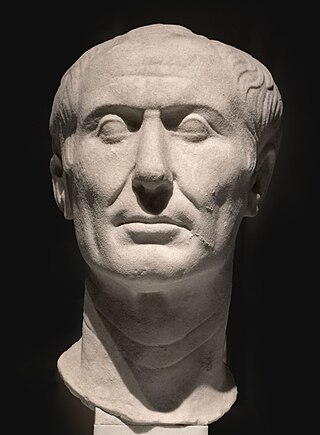
The terms enemy of the people and enemy of the nation are designations for the political opponents and for the social-class opponents of the power group within a larger social unit,who,thus identified,can be subjected to political repression. In political praxis,the term enemy of the people implies that political opposition to the ruling power group renders the people in opposition into enemies acting against the interests of the greater social unit:society,the nation,etc.
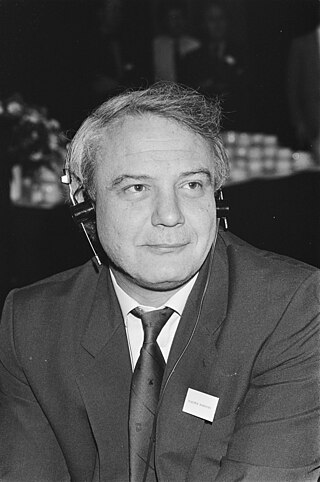
Vladimir Konstantinovich Bukovsky was a Soviet and Russian human rights activist and writer. From the late 1950s to the mid-1970s,he was a prominent figure in the Soviet dissident movement,well known at home and abroad. He spent a total of twelve years in the psychiatric prison-hospitals,labour camps,and prisons of the Soviet Union during Brezhnev rule.

Active measures is a term used to describe political warfare conducted by the Soviet Union and the Russian Federation. The term,which dates back to the 1920s,includes operations such as espionage,propaganda,sabotage and assassination,based on foreign policy objectives of the Soviet and Russian governments. Active measures have continued to be used by the administration of Vladimir Putin.

Vladimir Vladimirovich Kara-Murza is a Russian-British political activist,journalist,author,filmmaker,and former political prisoner. A protégéof murdered Russian dissident Boris Nemtsov,Kara-Murza is vice-chairman of Open Russia,an NGO founded by the exiled Russian businessman and former oligarch Mikhail Khodorkovsky,which promotes civil society and democracy in Russia. He was elected to the Coordinating Council of the Russian Opposition in 2012,and served as deputy leader of the People's Freedom Party from 2015 to 2016. He has directed two documentaries,They Chose Freedom and Nemtsov. As of 2021,he serves as Senior Fellow to the Raoul Wallenberg Centre for Human Rights. He was awarded the Civil Courage Prize in 2018.
Anatoliy Mikhaylovich Golitsyn CBE was a Soviet KGB defector and author of two books about the long-term deception strategy of the KGB leadership. He was born in Pyriatyn,USSR. He provided "a wide range of intelligence to the CIA on the operations of most of the 'Lines' (departments) at the Helsinki and other residencies,as well as KGB methods of recruiting and running agents." He became an American citizen by 1984.
The Mitrokhin Archive refers to a collection of handwritten notes about secret KGB operations spanning the period between the 1930s and 1980s made by KGB archivist Vasili Mitrokhin which he shared with the British intelligence in the early 1990s. Mitrokhin,who had worked at KGB headquarters in Moscow from 1956 to 1985,first offered his material to the US' Central Intelligence Agency (CIA) in Latvia,but they rejected it as possible fakes. After that,he turned to the UK's MI6,which arranged his defection from Russia.

Decommunization in Russia is the process of dealing with the communist legacies in terms of institutions and personnel that tends towards breaking with the Soviet past. Compared with the decommunization efforts of the other former constituents of the Eastern Bloc and the Soviet Union,it has been restricted to half-measures,if conducted at all.
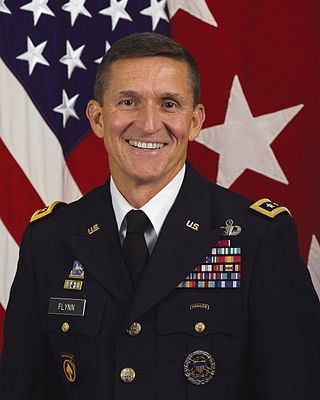
Michael Thomas Flynn is a retired United States Army lieutenant general who was the 24th U.S. national security advisor for the first 22 days of the first Trump administration. He resigned in light of reports that he had lied regarding conversations with Russian ambassador to the United States Sergey Kislyak. Flynn's military career included a key role in shaping U.S. counterterrorism strategy and dismantling insurgent networks in the Afghanistan and Iraq Wars,and he was given numerous combat arms,conventional,and special operations senior intelligence assignments. He became the 18th director of the Defense Intelligence Agency in July 2012 until his forced retirement from the military in August 2014. During his tenure he gave a lecture on leadership at the Moscow headquarters of the Russian military intelligence directorate GRU,the first American official to be admitted entry to the headquarters.
Russian espionage in the United States has occurred since at least the Cold War,and likely well before. According to the United States government,by 2007 it had reached Cold War levels.

Sally Quillian Yates is an American lawyer. From 2010 to 2015,she was United States Attorney for the Northern District of Georgia. In 2015,she was appointed United States Deputy Attorney General by President Barack Obama. Following the inauguration of President Donald Trump and the departure of Attorney General Loretta Lynch on January 20,2017,Yates served as Acting Attorney General for 10 days.

The Russian government conducted foreign electoral interference in the 2016 United States elections with the goals of sabotaging the presidential campaign of Hillary Clinton,boosting the presidential campaign of Donald Trump,and increasing political and social discord in the United States. According to the U.S. intelligence community,the operation—code named Project Lakhta—was ordered directly by Russian president Vladimir Putin. The "hacking and disinformation campaign" to damage Clinton and help Trump became the "core of the scandal known as Russiagate". The 448-page Mueller Report,made public in April 2019,examined over 200 contacts between the Trump campaign and Russian officials but concluded that there was insufficient evidence to bring any conspiracy or coordination charges against Trump or his associates.

The Steele dossier,also known as the Trump–Russia dossier,is a controversial political opposition research report on the 2016 presidential campaign of Donald Trump compiled by counterintelligence specialist Christopher Steele. It was published without permission in 2017 as an unfinished 35-page compilation of "unverified,and potentially unverifiable" memos that were considered by Steele to be "raw intelligence —not established facts,but a starting point for further investigation".
This is a timeline of events related to Russian interference in the 2016 United States elections.
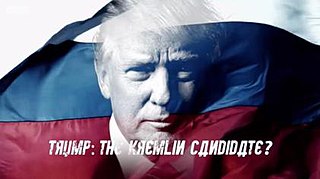
Trump:The Kremlin Candidate? is a documentary film first broadcast by the program Panorama on BBC One,and first aired in the United Kingdom on 16 January 2017,four days before the Inauguration of Donald Trump. It examined links between Trump associates and Russian officials and spies and the relationship between Vladimir Putin and Donald Trump. It features investigative journalist John Sweeney,who journeyed to Russia,Ukraine,Lithuania,and the United States during the course of his research. Sweeney had prior experience on the subject matter,having interviewed Trump in 2013,and Putin in 2014. The film was directed by Matthew Hill,Tomiko Newson,and Nick Sturdee.
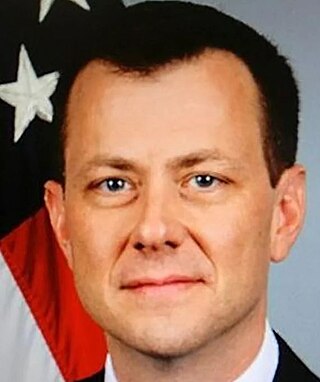
Peter Paul Strzok II is a former United States Federal Bureau of Investigation (FBI) agent. He was the Deputy Assistant Director of the FBI's Counterintelligence Division and led the investigation into Russian interference in the 2016 United States elections. Previously,he had been the chief of the division's Counterespionage Section and led the investigation into Hillary Clinton's use of a personal email server.
This is a timeline of major events in the first half of 2017 related to the investigations into links between associates of Donald Trump and Russian officials and spies that are suspected of being inappropriate,relating to Russian interference in the 2016 United States elections. Following the timeline of Russian interference in the 2016 United States elections before and after July 2016 up until election day November 8 and the post-election transition,this article begins with Donald Trump and Mike Pence being sworn into office on January 20,2017,and is followed by the second half of 2017. The investigations continued in the first and second halves of 2018,the first and second halves of 2019,2020,and 2021.
This is a timeline of events related to Russian interference in the 2016 United States elections,sorted by topics. It also includes events described in investigations into the many suspicious links between Trump associates and Russian officials and spies. Those investigations continued in 2017,the first and second halves of 2018,and 2019,largely as parts of the Crossfire Hurricane FBI investigation,the Special Counsel investigation,multiple ongoing criminal investigations by several State Attorneys General,and the investigation resulting in the Inspector General report on FBI and DOJ actions in the 2016 election.
This is a chronology of significant events in 2016 and 2017 related to the many suspicious links between Trump associates and Russian officials and spies during the Trump presidential transition and the Russian interference in the 2016 United States elections. Following the timeline of Russian interference in the 2016 United States elections before and after July 2016,this article begins on November 8 and ends with Donald Trump and Mike Pence being sworn into office on January 20,2017. The investigations continued in the first and second halves of 2017,the first and second halves of 2018,the first and second halves of 2019,2020,and 2021.

United States v. Flynn was a criminal case in the United States District Court for the District of Columbia which was dismissed without any convictions in December 2020 following a presidential pardon. Michael Flynn,a retired lieutenant general in the United States Armed Forces,had accepted President-elect Donald Trump's offer for the position of National Security Advisor in 2016 and then briefly served as National Security Advisor. He pleaded guilty to one count of making false statements to the Federal Bureau of Investigation. Flynn's alleged false statements involve conversations he had with Russian Ambassador Sergey Kislyak when Flynn was incoming National Security Advisor to President-elect Trump,and Flynn agreed to cooperate with the Special Counsel investigation as part of a plea deal.
Compromised:Counterintelligence and the Threat of Donald J. Trump is a 2020 non-fiction book authored by former FBI agent Peter Strzok. As Deputy Assistant Director of the FBI counterintelligence division,Strzok led the FBI's Crossfire Hurricane investigation of alleged Russian influence upon President Donald Trump and Trump's 2016 campaign. Strzok's book recaps the full arc of the investigation and portrays Trump as profoundly corrupt,and a serious threat to national security.
References
- ↑ Hoffman, David (2003). The Oligarchs: Wealth and Power in the New Russia. New York: PublicAffairs. p. 272. ISBN 1-586-48202-5.
- ↑ Koltsova, Olessia (2006). News Media and Power in Russia. BASEES/Routledge series on Russian and East European Studies. Routledge. p. 108. ISBN 0-415-34515-4.
- ↑ White, Stephen; McAllister, Ian (2006). "Politics and the Media in Post-Communist Russia" (PDF). In Voltmer, Katrin (ed.). Mass Media and Political Communication in New Democracies. Routledge/ECPR studies in European political science. Abingdon-on-Thames: Routledge. pp. 225–226. ISBN 0-415-33779-8. Archived from the original (PDF) on 19 August 2006. Retrieved 16 September 2018.
- ↑ Wheatley, Jonathan (2005). Georgia from National Awakening to Rose Revolution: Delayed Transition in the Former Soviet Union. Ashgate Publishing. pp. 104–105. ISBN 0-754-64503-7.
- ↑ Operation Smear Campaign, The Ukrainian Week (10 September 2013)
- ↑ Braun, Elisa (14 February 2020). "How kompromat on a close Macron ally went viral". POLITICO. An example of the use of "kompromat"
- ↑ Choy, James P. (2020). "Kompromat: A theory of blackmail as a system of governance". Journal of Development Economics. 147: 102535. doi:10.1016/j.jdeveco.2020.102535. ISSN 0304-3878. S2CID 225375805.
- 1 2 Ledeneva, Alena V. (30 September 2013). How Russia Really Works: The Informal Practices That Shaped Post-Soviet Politics and Business. Cornell University Press. p. 288. ISBN 9780801470059 . Retrieved 12 January 2017.
- 1 2 Higgins, Andrew (9 December 2016). "Foes of Russia Say Child Pornography Is Planted to Ruin Them". The New York Times . Retrieved 11 January 2017.
- ↑ Waxman, Olivia B. (12 January 2017). "Document Claims Russia Has Donald Trump 'Kompromat.' What Is That?". Time . New York . Retrieved 12 January 2017.
- ↑ Maher, Richard (12 January 2017). "What is 'kompromat' and how does it work?". New Statesman . London: GlobalData. ISSN 1364-7431 . Retrieved 12 January 2017.
Kompromat has become a part of the political culture in Russia. Nearly everyone within Russia's business and political elite has at one time or another collected and stored potentially compromising material on their political opponents for future use. Kompromat can be real or fabricated, and generally involves drugs, prostitutes, sexual escapades, sleazy business deals, illicit financial schemes, or embezzlement.
- ↑ Woolf, Christopher (11 January 2017). "Moscow's long history of gathering 'kompromat'". Minneapolis: Public Radio International . Retrieved 12 January 2017.
'Kompromat,' says David Filipov, 'means "compromising material" that can be used down the road as leverage over somebody. [...] 'This was something former KGB officers were telling us here,' adds Filipov, 'they're not necessarily targeting you. You show up and they say, let's just see what this guy does. So they'll record you, they'll do surveillance, see what you're up to. Some stuff gets in a file and maybe they can use it, maybe they can't use it.
- 1 2 Ioffe, Julia (11 January 2017). "How Blackmail Works in Russia". The Atlantic . Washington, D.C. Retrieved 11 January 2017.
- ↑ Tucker, Joshua (12 January 2017). "Everything you need to know about the Russian art of 'kompromat'" . The Washington Post . ISSN 0190-8286 . Retrieved 12 January 2017.
- ↑ Davidson, Adam (19 July 2018). "A Theory of Trump Kompromat". The New Yorker. ISSN 0028-792X . Retrieved 1 August 2019.
- ↑ "Settlements prompt review of New Mexico's settlement system". AP NEWS. 23 May 2019. Retrieved 1 August 2019.
- ↑ Jones, Bryony; Mackintosh, Eliza (12 January 2017). "What is Kompromat?". CNN . Retrieved 12 January 2017.
- ↑ Higgins, Andrew; Kramer, Andrew (12 January 2017). "Sexual blackmail, Russia style: a history of 'kompromat'". The Irish Times . Dublin . Retrieved 12 January 2017.
- 1 2 Hodge, Nathan; Grove, Thomas (11 January 2017). "Trump Dossier Spotlights Russian History of 'Kompromat'". The Wall Street Journal . New York . Retrieved 11 January 2017.
- ↑ Osborn, Andrew (28 April 2010). "Amateur model known as 'Katya' revealed as Russian honey trap bait". Daily Telegraph . London . Retrieved 11 January 2017.
- ↑ Higgins, Andrew (9 December 2016). "Foes of Russia Say Child Pornography Is Planted to Ruin Them". The New York Times . Retrieved 26 January 2017.
- 1 2 Myre, Greg (11 January 2017). "A Russian Word Americans Need To Know: 'Kompromat'". All Things Considered . Washington D.C. National Public Radio. A Russian Word Americans Need To Know: 'Kompromat' . Retrieved 29 January 2019.
In other recent cases, Russian operatives have been suspected or accused of placing child pornography on the personal computers of individuals they were attempting to discredit. Russian Vladimir Bukovsky, 73, a longtime critic of Soviet and Russian leaders, now lives in Britain, where he faces charges related to child pornography. But the case was delayed while investigators checked to see whether the images on Bukovsky's computer were placed there by an outside party, The New York Times reported last month, citing other similar cases.
- ↑ "Vladimir Bukovsky to be prosecuted over indecent images of children". Crown Prosecution Service. 27 April 2015. Archived from the original on 18 November 2016. Retrieved 11 January 2017.
- ↑ Higgins, Andrew. "Vladimir Bukovsky, Revered Soviet Dissident and Putin Critic, Dies at 76." New York Times , 28 October 2019. Retrieved 14 August 2020
- ↑ Nelson, Eliot; Young, Jeffrey (10 January 2017). "Kompromat? More Like KomproMAGA!". The Huffington Post . Oath . Retrieved 11 January 2017.
- ↑ "Trump says Russian 'kompromat' claims are fake". Financial Times . London: Nikkei. 11 January 2017. Retrieved 11 January 2017.
- ↑ Townsend, Mark; Smith, David (14 January 2017). "Senior British politicians 'targeted by Kremlin' for smear campaigns". The Guardian . London . Retrieved 16 September 2018.
- ↑ Wright, Austin (8 May 2017). "Sally Yates: 'We believed that Gen. Flynn was compromised'". Politico . Arlington: Capitol News Company . Retrieved 24 February 2018.
- ↑ Lizza, Ryan (9 May 2017). "Michael Flynn's Questionable Conduct, and Trump's". The New Yorker . Retrieved 24 February 2018.